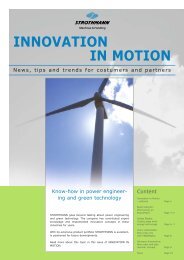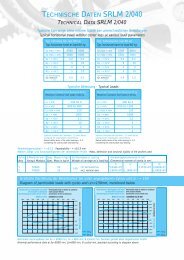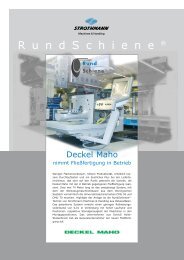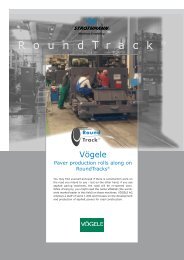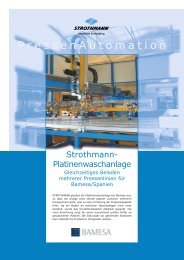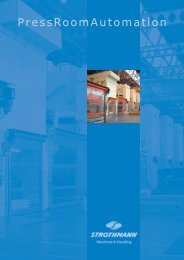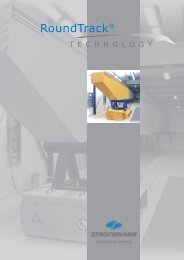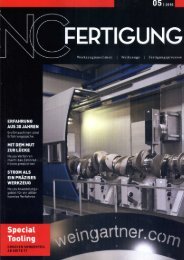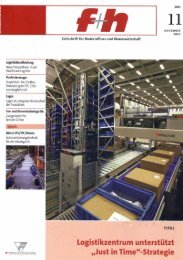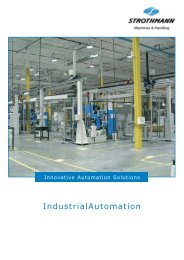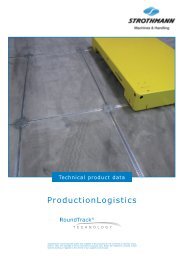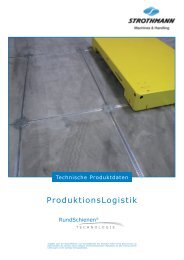GERMAN AMERICAN - Strothmann
GERMAN AMERICAN - Strothmann
GERMAN AMERICAN - Strothmann
You also want an ePaper? Increase the reach of your titles
YUMPU automatically turns print PDFs into web optimized ePapers that Google loves.
Interview with Michael Spiegel,<br />
CEO STROTHMANN Machines & Handling<br />
Q: Mr. Spiegel, STROTH-<br />
MANN started as a small<br />
machine engineering com-pany<br />
in East Westphalia / Germany.<br />
Today, STROTHMANN handling<br />
systems can be found all<br />
over the world – in the U.S. for<br />
example at the Magna plant at<br />
Spartanburg / South Carolina.<br />
What’s the STROTHMANN<br />
secret?<br />
A: Actually, it’s no secret, but<br />
all too obvious: Keep innovating,<br />
improve your know-how,<br />
keep moving – the STROTH-<br />
MANN formula for this is<br />
“Innovation in Motion”. Our<br />
products – RoundTrack, linear<br />
shuttles, destackers, centering<br />
stations – are notable for presenting<br />
simple and effective<br />
answers to the handling and<br />
transportation needs of our customers.<br />
Q: Who are your customers?<br />
A: Customers include companies<br />
from branches like furniture<br />
industry, machine engineering,<br />
even Airbus Industries.<br />
Metal sheet processing, especially<br />
the automotive industry, is of<br />
course very important. Here,<br />
STROTHMANN has gathered<br />
considerable expertise over the<br />
years through implementing<br />
systems for press line automation<br />
all over Germany and<br />
Europe.<br />
Q: So, if I am in the auto<br />
business, what’s my STROTH-<br />
MANN advantage?<br />
A: There are very rigid<br />
demands concerning quality<br />
standards and delivery reliability,<br />
because in this field, all<br />
chances to cut the costs have to<br />
be pursued to stay ahead of the<br />
global competition. Think of<br />
concepts like just in time or lean<br />
production, platform and modular<br />
strategies – many of these<br />
stem from the automotive<br />
industry. In a situation like this,<br />
the suppliers are under constant<br />
pressure. And a production line<br />
that isn’t operated efficiently,<br />
suffers from frequent downtimes,<br />
slow tooling, ineffective<br />
handling etc. is wasting a lot of<br />
money. Dynamic handling<br />
solutions are a key factor to face<br />
the competition.<br />
Q: Which means: Press line<br />
automation “Made in<br />
Germany” for the rest of the<br />
world?<br />
A: Well, that’s too strong a<br />
statement. Of course, the global<br />
scope and structure of the<br />
industry, with production lines<br />
and suppliers distributed all<br />
over the world, was definitely a<br />
reason to expand our business<br />
beyond Germany and Europe –<br />
and to open up the enormous<br />
North American market. But<br />
when I mentioned moving and<br />
mobility a little earlier, I was<br />
also driving at the ability to<br />
adapt to a particular market.<br />
Q: So, what is special about<br />
the American market?<br />
A: The first which comes to<br />
my mind is the service, which is<br />
at least as impor-tant as the<br />
technology. The consequences<br />
are far beyond establishing a<br />
service network. It’s more about<br />
construction and design of your<br />
machines: One must be able to<br />
eliminate failures and malfunctions<br />
in the easiest way possible.<br />
In Europe, you often rely on the<br />
experts on site, who will investigate<br />
and fix the problem (sooner<br />
or later). In the U.S., you<br />
exchange a module – and production<br />
continues. Another specialty<br />
are FMEA- (Failure Mode<br />
and Effect Analysis) and RCM-<br />
/R&M- (Reliability Centered<br />
Maintenance) studies. They are<br />
costly, of course, but in the long<br />
run, you benefit from an<br />
extended know-how and<br />
improved product quality. And<br />
last but not least: We learned<br />
that flexibility in product management<br />
is an important quality<br />
while working together with<br />
our American partners.<br />
“Nothing is as sure as change”,<br />
as you say – but nevertheless<br />
you have to keep the deadline.<br />
So engineering, structured planning<br />
and coordination skills<br />
must go hand-in-hand.<br />
Q: Taking the other perspective,<br />
are there any special characteristics<br />
of Ger-man automation?<br />
A: Americans like the high<br />
quality standards of our<br />
machine building. “Made in<br />
Germany” has a good ring to it.<br />
True, there are many areas<br />
where Americans are using<br />
domestic automation parts, but<br />
for many key components –<br />
especially in the automotive<br />
industry – the label “Made by<br />
STROTHMANN” is very important<br />
– and that’s a major stimulus<br />
for us, to keep on innovating.<br />
Cover Story<br />
German American Trade · Vol. 15 · No. 3 11



